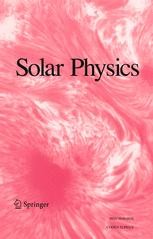Editors' Choice: "What the Sudden Death of Solar Cycles Can Tell Us About the Nature of the Solar Interior"
 McIntosh, S.W., Leamon, R.J., Egeland, R. et al., What the Sudden Death of Solar Cycles Can Tell Us About the Nature of the Solar Interior, Sol Phys (2019) 294: 88. https://doi.org/10.1007/s11207-019-1474-y
McIntosh, S.W., Leamon, R.J., Egeland, R. et al., What the Sudden Death of Solar Cycles Can Tell Us About the Nature of the Solar Interior, Sol Phys (2019) 294: 88. https://doi.org/10.1007/s11207-019-1474-y
Editor's Choice (Research Article)
First Online: 09 July 2019
Abstract:
We observe the abrupt end of solar-activity cycles at the Sun’s Equator by combining almost 140 years of observations from ground and space. These “terminator” events appear to be very closely related to the onset of magnetic activity belonging to the next solar cycle at mid-latitudes and the polar-reversal process at high latitudes. Using multi-scale tracers of solar activity we examine the timing of these events in relation to the excitation of new activity and find that the time taken for the solar plasma to communicate this transition is of the order of one solar rotation – but it could be shorter. Utilizing uniquely comprehensive solar observations from the Solar Terrestrial Relations Observatory (STEREO) and Solar Dynamics Observatory (SDO) we see that this transitional event is strongly longitudinal in nature. Combined, these characteristics suggest that information is communicated through the solar interior rapidly. A range of possibilities exist to explain such behavior: for example gravity waves on the solar tachocline, or that the magnetic fields present in the Sun’s convection zone could be very large, with a poloidal field strengths reaching 50 kG – considerably larger than conventional explorations of solar and stellar dynamos estimate. Regardless of the mechanism responsible, the rapid timescales demonstrated by the Sun’s global magnetic-field reconfiguration present strong constraints on first-principles numerical simulations of the solar interior and, by extension, other stars.
Solar Physics Editor's Choice:
In each volume of Solar Physics, a few papers are marked as “Editors’ Choice”. The primary criteria is original, high quality research that is of wide interest within the community.
